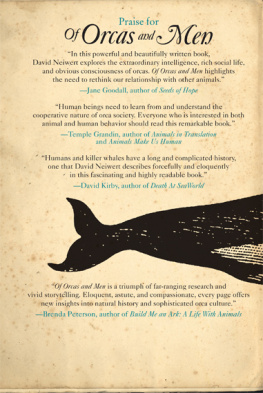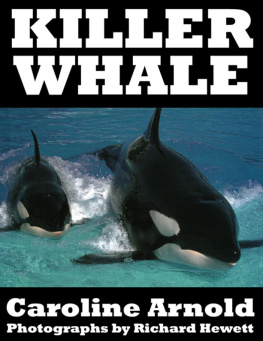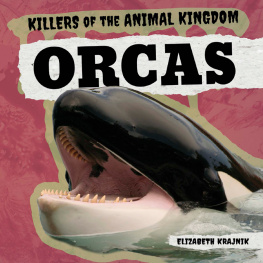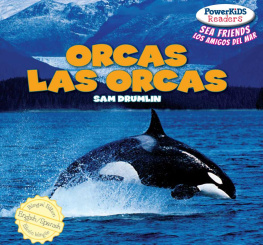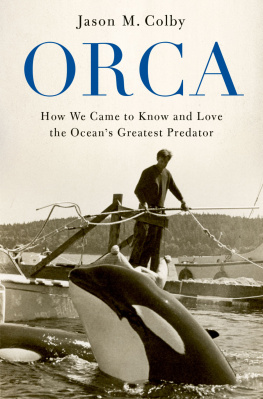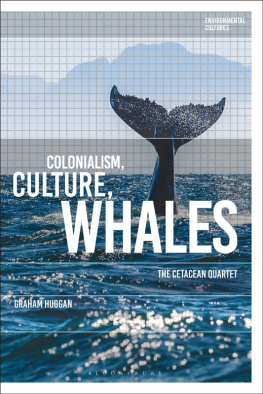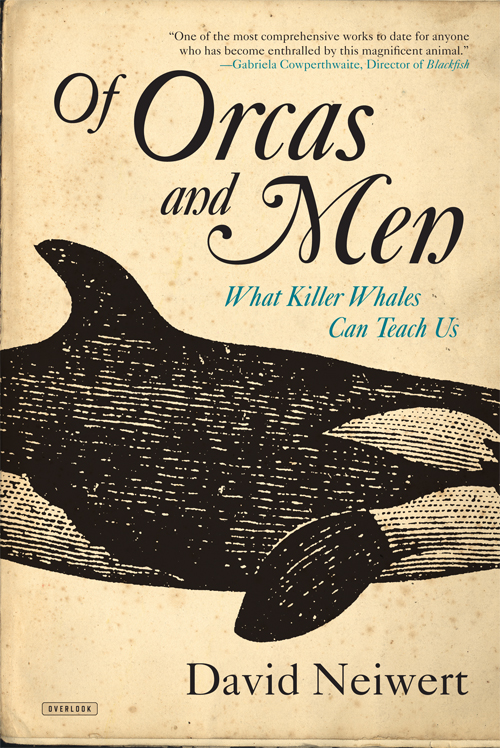This edition first published in hardcover in the United States in 2015 by
The Overlook Press, Peter Mayer Publishers, Inc.
141 Wooster Street
New York, NY 10012
www.overlookpress.com
For bulk and special sales, please contact ,
or write us at the address above.
Copyright 2015 David Neiwert
All rights reserved. No part of this publication may be reproduced or transmitted in any form or by any means, electronic or mechanical, including photocopy, recording, or any information storage and retrieval system now known or to be invented, without permission in writing from the publisher, except by a reviewer who wishes to quote brief passages in connection with a review written for inclusion in a magazine, newspaper, or broadcast.
ISBN: 978-1-4683-0865-5
ISBN: 978-1-4683-1229-4 (e-book)
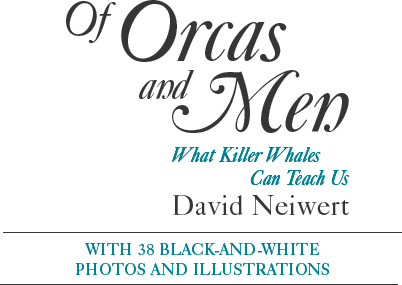
T he orcaotherwise known as the killer whaleis one of earths most intelligent animals. Remarkably sophisticated, orcas have languages and cultures and even long-term memories, and their capacity for echolocation is nothing short of a sixth sense. They are also benign and gentle, which makes the story of the captive-orca industryand the endangerment of their population in Puget Soundthat much more damning.
In Of Orcas and Men, a marvelously compelling mix of cultural history, environmental reporting, and scientific research, David Neiwert explores an extraordinary species and its occasionally fraught relationship with human beings. Beginning with their role in myth and contemporary popular culture, Neiwert shows how killer whales came to capture our imaginations, and brings to life the often catastrophic environmental consequences of that appeal.
In the tradition of Barry Lopezs classic Of Wolves and Men, David Neiwerts book is a triumph of reporting, observation, and research, and a powerful tribute to one of the animal kingdoms most remarkable members.
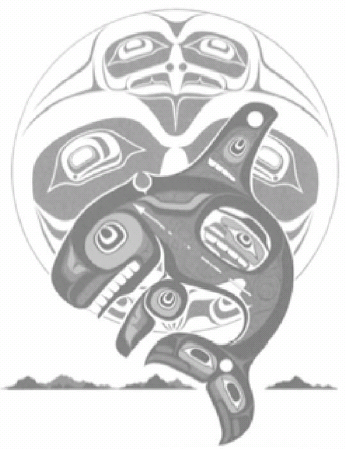
Drawing by Yukie Adams
To Lisa, who makes everything possible
A dolphin appears to be a who, not a whata being, not an objectwith a sophisticated, individual awareness of the world.
T HOMAS I. W HITE , In Defense of Dolphins
A human being is part of a whole, called by us the universe. A part limited in time and space. He experiences himself, his thoughts and feelings, as something separate from the rest, a kind of optical delusion of his consciousness. This delusion is a kind of prison for us, restricting us to our personal desires and to affection for a few persons nearest to us. Our task must be to free ourselves from this prison by widening our circle of compassion to embrace all living creatures.
A LBERT E INSTEIN
Y OU WILL OFTEN HEAR IT BEFORE YOU SEE IT; SOMEWHERE IN THE lowering gray fog, there is the loud, almost popping kooosh sound. Then you see it: The towering black fin, six feet high, gliding out of the water atop the massive back of a thirty-foot killer whale. Directly toward your little kayak.
You may have prepared for this moment. You may know full well that wild orcas have never been known to attack human beings. You may have observed them around boats and kayaks, and you may already know that these graceful behemoths are in complete control of their whereabouts and always avoid contact. You may have even experienced this previously.

L78, Solstice, surfaces near my kayak.
It doesnt matter. Your stomach will still disappear into your body, and you will feel puny and powerless. You will know that you are at the mercy of a gigantic predator, the undisputed ruler of the ocean. You may also observe that you had no idea something so large could move so easily and gracefully and quickly through the water toward you.
Profoundly humbling experiences are good for our souls: those knee-knocking, gut-emptying, jaw-dropping, life-altering moments when you come flat up against the reality that we are each, no matter how big our egos or incomes, insignificant flesh-specks fortunate enough to be alive in this grand universe, those moments such as when we stay up late to see the Milky Way on a summers night in the Rockies, or stand agape at the edge of the Grand Canyon or an erupting volcano in Hawaii, or watch the birth of our own child. Of all these, there are few as deeply affecting as having an encounter in the wild with one of natures premier meat-eaters, and of these, none are as profound as having a five-ton killer whale with a towering dorsal fin come looming toward your kayak out of the fog.
Its one thing to see a lion, or a bear, or a shark, or even an orca behind glass at a zoo or aquarium. You cant help but be impressed, of course, not just with the magnificence of the animals, but also with your real gratitude that the glass is there between you. At the same time, there are hardly ever any real interactions with captive animals, at least hardly any that are good for either animal or audience. The barrier keeps everything at a safe remove. This is especially so at the marine parks where orcas are put on display for audiences to ooh and aah as they perform astonishing stunts of grace and intelligence.
But to encounter such a creature in the wildwell, thats something else.
Over the years, Ive been fortunate enough to have had three such encounters in the Rockies, two of them with grizzly bears that happened to be using the same trail on which I was hiking and then biking. The other was really just a brief but chilling glimpse from the trail I was traversing of a mountain lion running in the other direction. It doesnt matter how big or tough you might think you are or how well youve prepared yourself intellectually for these encounters (frequent visitors to the woods, if theyre savvy at all, will always read up on the best techniques for surviving these encounters). Your mind will go blank, your stomach will become a massive black hole, and your body will be seized with a nearly uncontrollable urge to get far from this location as quickly as possible.
This has always felt primeval and visceral, part of our human hard-wiring. Survival of the fittest is often a matter of effective flight, especially for a species such as ours. Man is a top-tier predator with his gadgets and guns at hand, but without them he is just prey like any other, particularly when it comes to the real top-of-the-food-chain predators like sharks and tigers. Before we invented our killing technology, we probably survived by knowing when and where to run.
Fortunately, my wild encounters in the Rockies were utterly harmless. They drove home, however, a lesson not to be forgotten about humans relative puniness in the grand scheme of the living world. Sure, I could always bring along a good can of bear spray (and tended to thereafter), but the truth is that even that is never a sure thing. Guns are similarly about as useful; one might scare them off, but grizzlies in particular are known to easily absorb or deflect gunshots. If one wants to eat you or just kill you, it probably will.
Killer whales are the planets only apex predator about whom you can say that the potential for being killed and eaten really doesnt exist. Even though they have been observed countless times over the centuries devouring species ranging from humpback whales to sea lions to moose, there have been only a few recorded attacks on humans by orcas in the wild, and those mostly against boats carrying humans. (This benign relationship with humans cannot be said of orcas in captivity, but that is another part of our story.) And yes, you can tell yourself, as you launch your kayak into waters frequented by killer whales, fully awareindeed, often eagerly hopefulthat you might encounter them there, that you will not be in danger. However, when the reality comes to pass, and that six-foot fin comes looming toward you out of the gray mist, you remember none of that.

